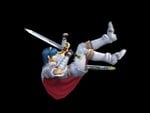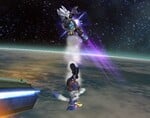Tumbling
Tumbling is an airborne state that a character may enter after being hit or pushed in certain ways; for example, edge slipping can cause a character to tumble. A tumbling character may be identified by his or her defensive, rotating animation. Characters may tumble after being hit through the air by an attack with strong enough knockback, after being footstooled in midair, after being pushed off a ledge, or after walking off an edge while carrying a crate or other heavy item. Tumbling is not the same state as helplessness; tumbling characters can carry out most normal airborne actions while tumbling:
- They can move left and right through the air as per normal.
- They can perform aerial attacks, use any remaining jumps, and use any special moves, all of which end the tumbling state.
- In Super Smash Bros. Brawl, air dodging can also be performed as per normal and will end tumbling - this was not possible in Super Smash Bros. Melee.
- In Brawl tumbling characters cannot use a zairtether recovery while tumbling, as attempting to do so results in an air dodge.
- They can attempt to end the tumble and resume their normal aerial state by tapping the control stick sideways. This, however, does not work in the original Super Smash Bros.
- They can tech if they are about to hit a wall, ceiling or platform.
If tumbling characters hit the ground without teching, they will land into a lying position and must then use a floor recovery. Floor recoveries cannot be executed for a certain amount of time after landing.
Reeling
Reeling is a state similar to tumbling, except the characters enter a helix motion. Characters may reel after being hit by an attack with very powerful knockback. During this state, characters cannot do anything except DI, or tech if they come into contact with a wall or ceiling. Once the knockback diminishes and the character slows down, reeling ends and tumbling begins. Teching is useful for characters with high damage, or during Sudden Death matches, since being attacked under such circumstances often causes reeling.

